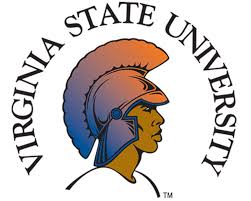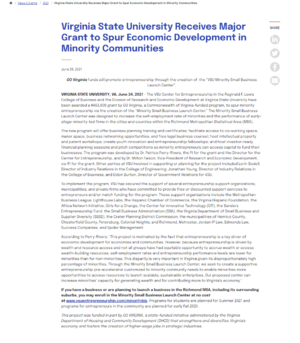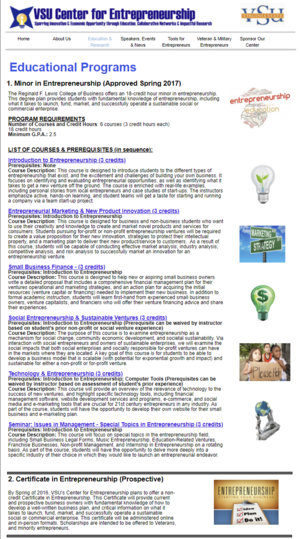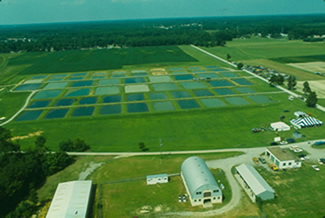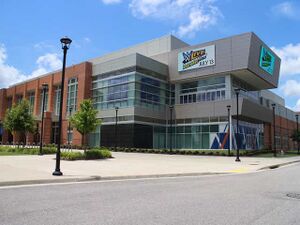School:Virginia State University
Contents
- 1 Overview
- 2 Promoting Student Innovation and Entrepreneurship
- 2.1 According to Virginia State University's 2021-2022 Undergraduate Catalog, we offer the following undergraduate innovation or entrepreneurship courses / resources:
- 2.2 According to the Virginia State University's 2021 - 2022 Graduate Catalog, we offer the following innovation or entrepreneurship courses:
- 2.3 Randolph Farm- 416acre agriculture learning center
- 3 Actively supporting the university technology transfer function.
- 4 Facilitating University-Industry Collaboration
- 5 Virgnia State University Multipurpose Center.jpgEngaging with regional and local economic development efforts
- 6 Landscape Canvas
- 7 Related Links
Overview
Building a Better World Since 1882
Virginia State University, founded in 1882, is one of Virginia's two land-grant institutions, and is located 20 minutes south of Richmond in the village of Ettrick. With a current student population of 5,300, the University sits atop a rolling landscape overlooking the Appomattox River with expansive views of Petersburg. Our 236-acre campus boasts 16 dormitories, 17 academic buildings and a 416-acre agriculture research facility.
Promoting Student Innovation and Entrepreneurship
Although, Virginia State University's innovation and entrepreneurship ecosystem is at it's developmental stage. The university offers opportunities for their students to gain an understanding of entrepreneurial aspects by gaining an acumen in the classroom and then applying what is learned.
'Encouraging Faculty Innovation and Entrepreneurship'
At Virginia State University, innovation and entrepreneurship are not emphasized as much as it should. We encourage our faculty and staff within our institution to become more supportive and invite more creative thinkers to become the trailblazers in breaking down the barriers. It will allow our institution to soar to new heights that have never been reached and open the door to great opportunities. Faculty are encouraged to create interdisciplinary activities or projects, to create partnerships within our institution. Faculty should be willing to utilize local business and startup company’s problems and present them to students for solutions and the development of an academic portfolio. Faculty should be eager to collaborate on research projects and work together to develop new technologies, products and innovative ideas campus-wide using all available resources. The College of Business is a great resource for the university and should be a tool students can use for financial direction. The College Of Engineering should become the catalyst on-campus for faculty/student innovation and become the vessel for innovation campus-wide. The goals of VSU should not only be to provide opportunities for students to acquire a position within a company, but to help develop a company through understanding of the business. VSU should also provide faculty and staff the capabilities to gain venture funding, develop intellectual property, form a business unit, and truly go out and create a business. VSU should develop a Research / Innovation center that offers mandatory courses and set of programs for all students to help bridge the gap between studies and practice, research and commercialization, and from dreams to reality. These programs should encourage students to understand the process of a product or service fundamentally from early discovery through commercialization. The objective is to help supportive faculty encourage entrepreneurs and promote corporate partnerships and startup companies in hopes that students can commercialize ideas as they reach later stages of studies. One strategy that can help develop this network should be an organization around the idea of entrepreneurship and innovation. An organization that helps students and faculty come together and achieve their common goals through practice. An organization that can help empower a Research / Innovation center can eventually uplift our institution as a whole to increase entrepreneurial spirits campus-wide from networking events, competitive events, speaker series events, projects, and workshops. In a sense, these activities can eventually create avenues for students to soar into heights that some say are unreachable. Let’s break down barriers and Build a Better World, one student at a time.
Updated information, November 2021:
In September of 2016, the Reginald F. Lewis College of Business has established a VSU Center for Entrepreneurship as an education, research, and planning hub for budding entrepreneurs within not only the student body, but also the entirety of Central Virginia, including minorities and military veterans. This center also provides opportunities for innovation through bi-annual pitch competitions with a prize of $1000. To compound this, a 16 credit Minor in Entrepreneurship is also available for any undergraduate to pursue, along with a prospective certificate program. Additionally, in July of 2021, the VSU Center for Entrepreneurship received $453,000 from GO Virginia, a program funded by the Commonwealth of Virginia, for the creation of a Minority Small Business Leading Center to help early startup companies gain funding and assistance. This program is also targeted towards minority-led businesses.
However, it is important to note that these opportunities (with the exception of Minor courses, certificate courses, and the pitch competition) are tailored towards those who already have a startup in place. Although maker and venture spaces are mentioned as part of the Minority Small Business Leading Center's resources, none have been initiated on-campus yet.
As of 2022,VSU has Living Learning Dorms for students as a part of the Honors College Initiative.
According to Virginia State University's 2021-2022 Undergraduate Catalog, we offer the following undergraduate innovation or entrepreneurship courses / resources:
- The Reginald F. Lewis College of Business has approved an 18 credit minor in Entrepreneurship in Spring of 2017. These are the following applicable courses and their descriptions:
- Introduction to Entrepreneurship
- This course introduces students to the different forms of entrepreneurship along with the risks and reward with starting a business. This course also includes real examples of this through investigations of case studies as well as personal stories from entrepreneurs in the local area. Hand-on learning is the primary directive of this course
- Entrepreneurial Marketing & New Product Innovation
- This course assists students (with a Business major or not) with the formation and implementation of products for customers. Students have the choice of for-profit or non-profit ventures with a value proposition. This course helps students market innovation for entrepreneurship.
- Small Business Finance
- This course helps current or intending business owners to create a detailed proposal that includes a financial and action plan for their existing or prospective business. They will get direct learning from business owners and investors.
- Social Entrepreneurship & Sustainable Ventures
- This course explores entrepreneurship as it relates to changing social environments, developing the economy of a community, and sustaining society. The impact of social companies that are social responsible in their markets are explored.
- Technology & Entrepreneurship
- This course explores what 21st century technology is needed in order to assist with marketing their business (websites, advertisements, social media platforms, etc.). This course also involves creating a website for each students' small business plan.
- Seminar: Issues in Management - Special Topics in Entrepreneurship
- This course becomes more nuanced within the students' industry of entrepreneurship. They will be able to explore their fields of interest in this course and how they can connect this to their business plan.
- Introduction to Entrepreneurship
- Virginia State University's Center for Entrepreneurship has also approved a prospective Certificate of Entrepreneurship in Spring of 2016.
- This is a non-credit certificate that will walk prospective and current entrepreneurships through the process of developing, launching, funding, marketing, and successfully operating a business. It is administered online as well as in-person. Military veterans and minority entrepreneurships are offered scholarships for this certificate.
- Reginald F. Lewis College of Business (RFLC): MGMT 444 – Entrepreneurship and Small Business Mgmt. (As an Elective)
This course is an in-depth analysis of the entrepreneur’s role in conceptualizing, developing and managing small business ventures. Key personality and leadership traits of the entrepreneur are examined within the framework of risk-taking and new venture start-ups. The course is also designed to expose students to the problems and opportunities inherent in establishing and managing a small business and the techniques employed in launching and sustaining a new venture.
Prerequisites: COBU 301 AND COBU 302
- Reginald F. Lewis College of Business (RFLC): FINC 446 - Entrepreneurial Finance
This course examines small business start – up management with emphasis on financial decision-making for entrepreneurs, and the functions of investment banking institutions as they relate to small business capital acquisition and management. Also included are legal concerns and strategies for minority startup ventures. The case study method will be used.
Prerequisite: COBU 300 or equivalent
College of Agriculture: AGEC 140 - Introduction to Agribusiness Entrepreneurship(Replaced by AGEC 142 - Principles of Agric Economics)
This is an introductory course for all agricultural majors that will focus on the importance of business to the food and agricultural sector. The course will explore the mechanics of developing a business plan, applying the principles of marketing, management and finance.
- College of Agriculture: AGEC 142 - Principles of Agric Economics
This course explores the principles of economics as applied to the agriculture economy. The course highlights the agricultural development of the U.S.A. The course will also develop the concept of economics as a social science, as well as the fundamental principles explaining the behavior of major economic units such as the consumer and farm-firm; price determination in general; the concept of elasticity; and the characteristics of various market structures such as perfect competition, monopoly, and oligopoly. Students will be introduced to the application of economic principles to international trade, environmental management and agricultural policy.
- College of Agriculture: AGEC 340 - Agribusiness Entrepreneurship.
This course takes students through the process of owning businesses, since owning a business is the dream of many Americans. This course examines several cases to help individuals translate their business dreams into reality. While specific focus will be on agribusiness enterprises, a broad look at entrepreneurs in several industries will be adopted to give students a good picture of the entire business world and the opportunities and challenges entrepreneurs face. Using case study approach, businesses across several sectors (production, service, etc.) of the economy will be examined and analyzed to walk students through the business required to develop and present a business plan. The presentation will be evaluated by a panel of judges. The typical panel of judges includes loan officers, agribusiness analysts and entrepreneur/small business owners.
- College of Agriculture, Department of Family and Consumer Science: FACS 342 Occupational Family and Consumer Sciences
This course of study focuses on planning, implementing and evaluating Family and Consumer Sciences occupational education programs in chosen areas of occupational endorsement. In addition, this course explores leadership theory and practice in relation to theories and processes of innovation and change. It includes the opportunity to explore leadership techniques relevant to change management, entrepreneurship and innovation. You will be encouraged to use your own experience in leadership roles to inform discussion, enquiry, critical thinking and reflection.
Prerequisites: DIET 221 Principles of Food Preparations, DIET 310 Human Nutrition, FCCS 301 Child Development
- College of Engineering, Science and Technology: INLT 443 - Engineering and Technology Entrepreneurship.
This course covers concepts related to entrepreneurship relevant to engineering and technology applications. Major topics include entrepreneurial risk taking, startup strategies, innovative idea evaluation, business plan writing, financing and venture capital, managing growth and introducing and sustaining products and services. Through case studies and guest speakers, the course introduces students to the knowledge and skills needed to recognize and seize technological entrepreneurial opportunities.
Prerequisite: Junior or Senior standing
College of Humanities and Social Sciences, Department of Health, Physical Education Recreation and Dance - Minor: Sport Management (18 semester hours):(Inactive)
This minor prepares students for careers as entrepreneurs, producers, advertisers, public relations specialists, fund developers, event managers, consultants, sales representatives, sports researchers, and corporate executives in the collegiate, amateur, and professional sports industries.
- Honors College
As of August of 2021, the Honors Program has expanded into the Honors College. The Honors College is designed to meet the unique educational needs of Virginia State University’s academically talented and highly motivated undergraduate students. The primary goal of the Honors Program is to create and maintain a stimulating, supportive environment in which young scholars may engage in a wide range of challenging intellectual and creative pursuits. The program encourages the participation of all departments, fosters innovation and experimentation in undergraduate education, and supports University-wide cultural enrichment.
According to the Virginia State University's 2021 - 2022 Graduate Catalog, we offer the following innovation or entrepreneurship courses:
- College of Engineering, Science and Technology: CSED 504 – Innovations in Distance Learning
The students will explore the latest innovations in "E - learning" technologies and environments as well as theoretical issues central to e-learning. The course will address online learning environments including online learning communities, communication and sharing tools, content creation tools, and communities of practice. Students will design and implement e-learning modules as pertinent to their content area.
Randolph Farm- 416acre agriculture learning center
The centerpiece of the farm is the Cooperative Extension Pavilion, which houses faculty and staff offices and laboratories; it also contains meeting areas that are frequented by members of the agricultural community sharing learned research and educational information.In addition to producing the region's traditional row crops, the farm is utilized for research and education in areas of new and niche crops, alternative cropping methods, horticultural crops, nutrient management, water quality, animal production, and aquaculture production.
Actively supporting the university technology transfer function.
Currently, Virginia State University does not have a technology transfer function that allows for commercialization. Virginia State University has established a research foundation with the hopes to taking over these functions.
Facilitating University-Industry Collaboration
The following links are research alliances, collaborations, and partnerships that Virginia State has established:
- Southeastern Universities Research Association (SURA)
- Oak Ridge Associated Universities (ORAU)
- Historically Black Colleges and Universities/Minority Education Institutions (HBCU/MEI) Council
- Virginia Advanced Shipbuilding and Carrier Integration Center (VASCIC)
- Commonwealth Center For Advanced Manufacturing (CCAM)
- Virginia Logistics Research Center (VLRC)
- Servicemembers Opportunity Colleges (SOC)
Engaging with regional and local economic development efforts
As of November of 2021, the VSU Multipurpose Center has been completed and has served as an anchor for other universities as well as for events and, during the pandemic, as a vaccination clinic for the local area.
Landscape Canvas
Virginia State University - Landscape Canvas
Related Links
Virginia State University Student Priorities
Related links
